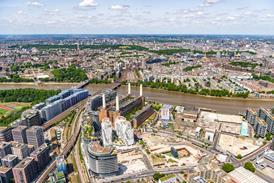But almost all rises trail consumer-price inflation and consultancy warns redundancies loom

Pay levels for new graduates entering architecture practices for the first time have risen by 13% compared with last year as firms scramble to attract new talent, according to the findings of an annual salary survey.
The survey of more than 2,000 professionals, conducted by architecture-recruitment firm 9B Careers, found that average salaries across the profession had increased by 6% since 2021. However the figure still represents a real-terms decrease at a time when inflation as measured by the Consumer Prices Index was 10.7% in the year to November.
The 9B survey responses suggested that professionals who have recently achieved their RIBA Part III qualification saw their pay increase by an average of 8% over the past year, and that mid-career architects are still “very much in demand”.
While salaries for all Part I-qualified staff increased by 5.3% on average, the survey found that average salaries for Part Is with absolutely no experience in practice rose by 13.7% between 2021 and 2022 – from £20,145 to £22,906.
9B director Paul Chappell said that at the other end of the scale, the data showed pay rises among practice directors were limited to an average of 1.4%, indicating those at the top of the profession were exercising restraint to keep firms on the rails.

“The cost-of-living crisis and ensuing recession has caused employers significant difficulties in recruiting and appropriately rewarding the best staff yet still staying profitable as fees have often been cut and other business costs have dramatically risen,” he said.
“It therefore appears that in order to balance the books, it has been the directors who have had to make the most sacrifices.”
Chappell said that against the backdrop of Russia’s invasion of Ukraine and with future workloads – as measured by the RIBA Future Trends survey – at a post-pandemic low, it was surprising how busy many practices had been in 2022.
“In terms of the number of jobs we have received within 9B, this year has only been 10% down on 2021, which was a record year,” he said.
“That said, the last couple of months since the mini-budget have seen a marked decline and it feels like the salary rises during 2022 may become a peak as we head into another recession.”

Chappell predicted increased competition for work in the New Year and warned that firms unable to secure enough would have no other option but to reduce headcount.
“As we move into 2023, I fear firms that don’t have a strong pipeline of work will start undercutting competitors and for those who are not subsequently winning new projects, redundancies will become inevitable,” he said.
“Within 9B, we have already seen an increase in applications from well-qualified architects. The candidate market of the last couple of years appears to be waning and I expect there will be far more competition for roles next year, which will likely put a handbrake on salary rises.”
Other findings of the 9B salary survey include a rising premium for Part III-qualified staff compared with their Part II-qualified colleagues.
Chappell said recently-qualified architects were now being paid around £5,550 more than Part IIs with the same number of years experience in practice – up from a premium of £4,250 in 2021.
The survey also indicated that bonuses for architecture professionals appeared to have recovered after being cut during the pandemic. It found that just under 45% of architectural staff receive a bonus – but exposed a gender gap: around 50% of male staff reported getting a bonus compared with just 39% of female staff.
Earlier this month RIBA’ Business Benchmarking 2022 survey reported that equality, diversity and inclusion progress appeared to have stalled, with gender and ethnicity pay gaps widening.
RIBA said more than 50% of practices still did not have EDI staff training in place. It added that the gender pay gap had widened from 15% to 17% since 2021, while the ethnicity pay gap had grown from 14% to 22%, based on data voluntarily submitted by practices with 100 or more staff.
















No comments yet